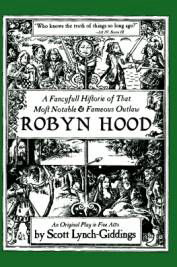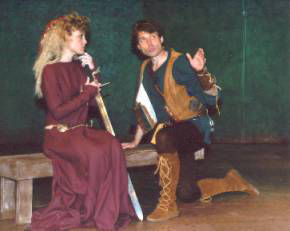
Introduction
Note: This is an article about a 1990s Robin Hood play done in the style of William Shakespeare. If you want to read about the Robin Hood legend during Shakespeare's own time, check out this page.
In the plays of Shakespeare, there are some references to Robin Hood and his men. And As You Like It is like a Robin Hood play without Robin Hood. Some of Shakespeare's contemporaries wrote Robin Hood plays. But William Shakespeare himself never dealt with the outlaw legend directly nor in great length -- until 1995, that is.
Scott Lynch-Giddings is a Chicago playwright who wondered what a Shakespearean Robin Hood might be like, and so he set out to write the Bard's version of Robin Hood.

Contact Us